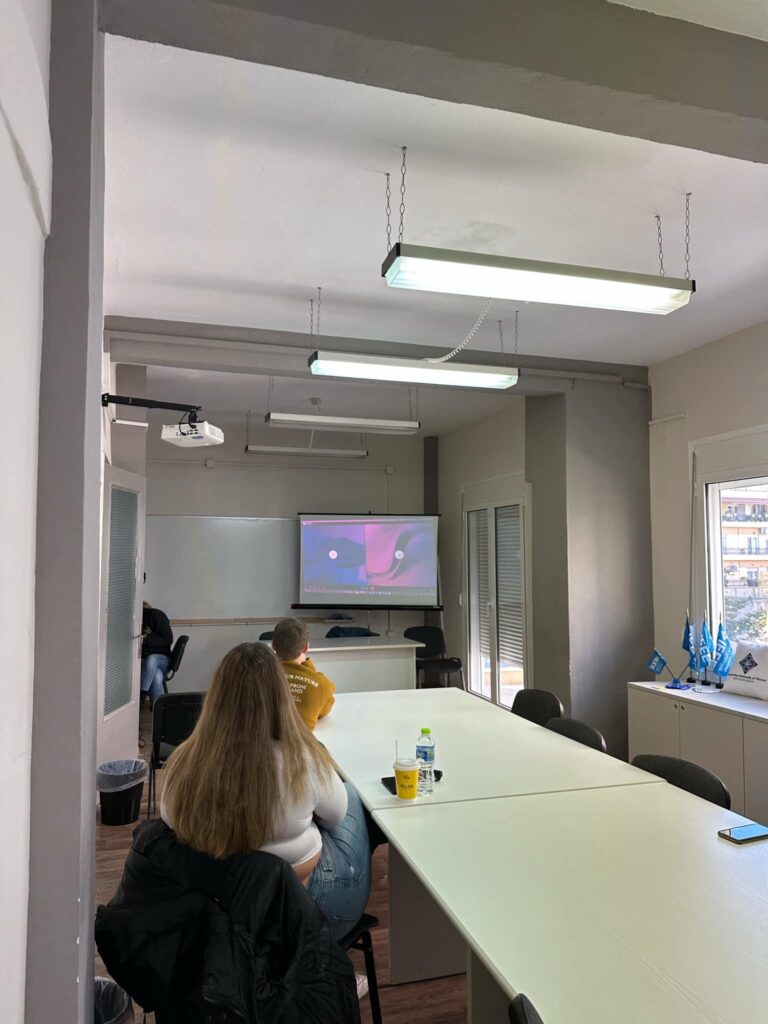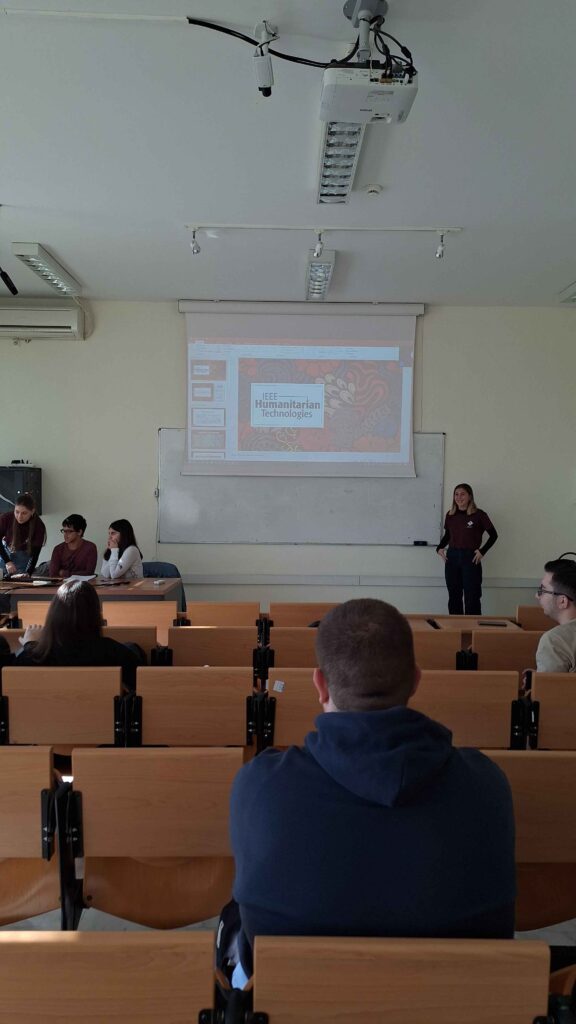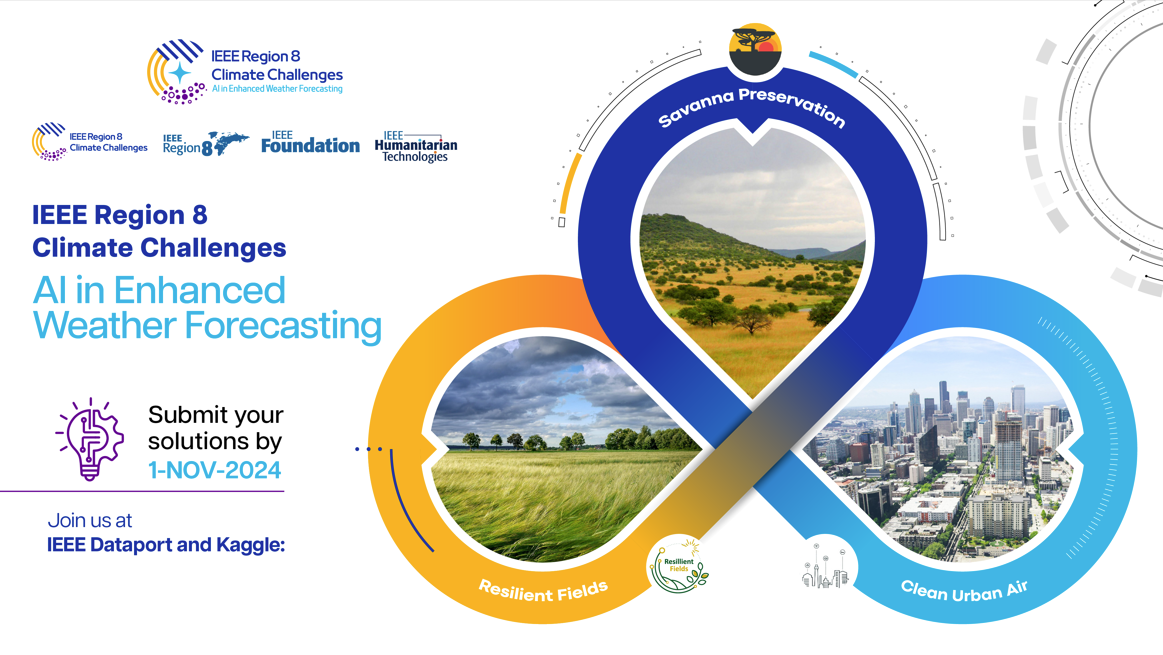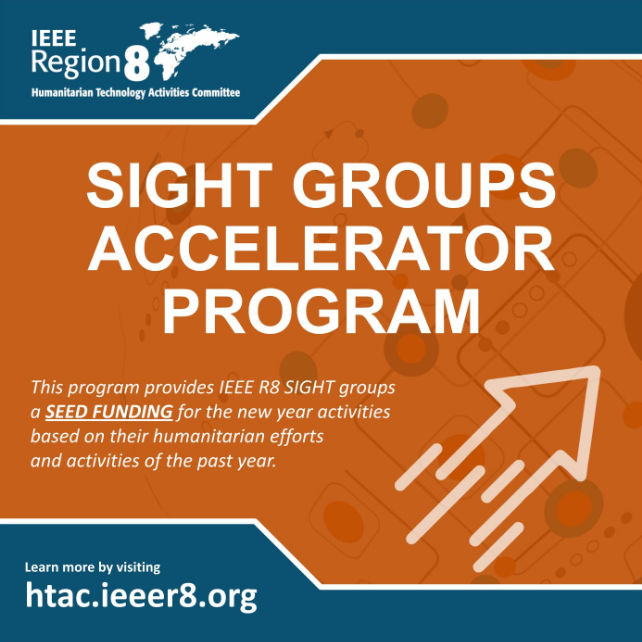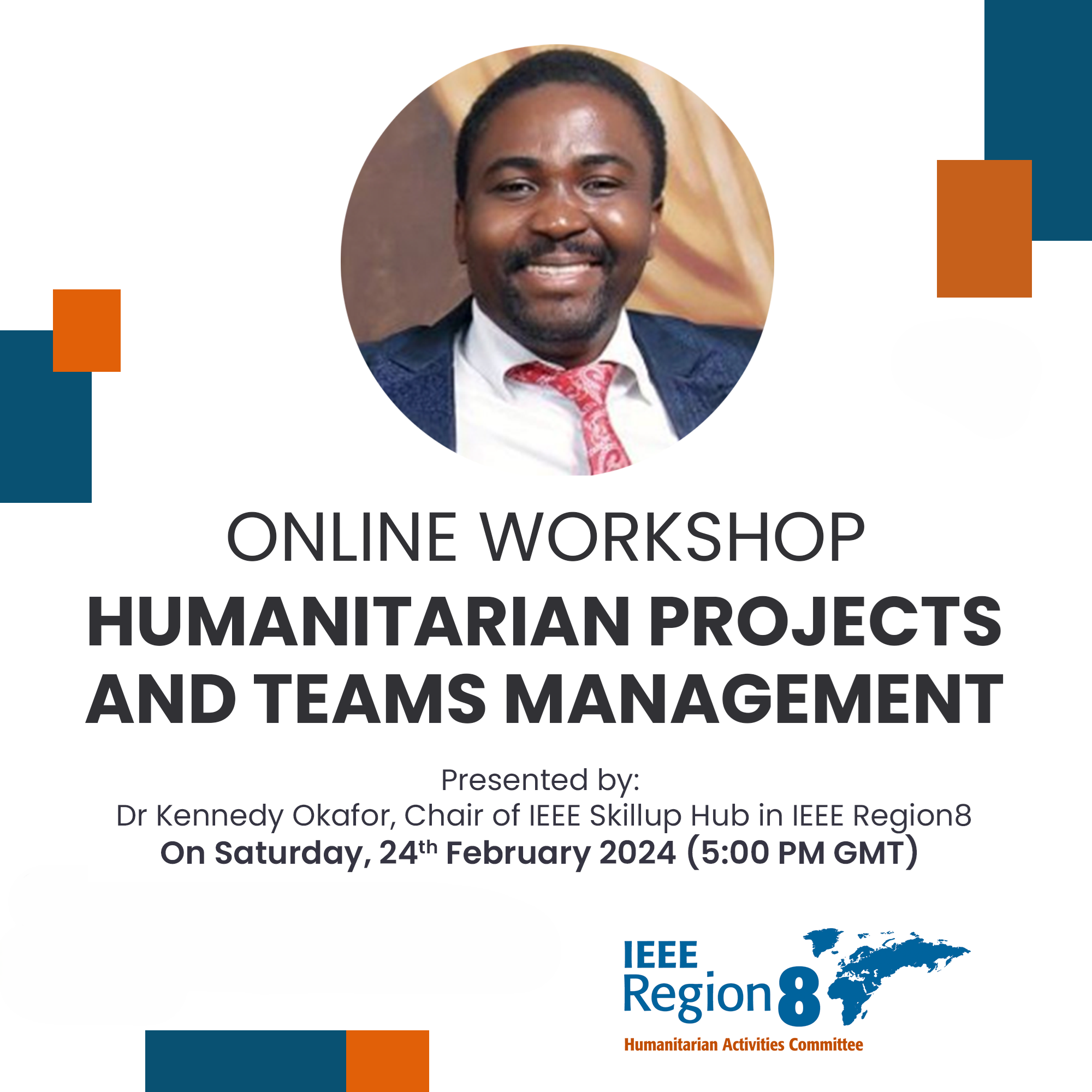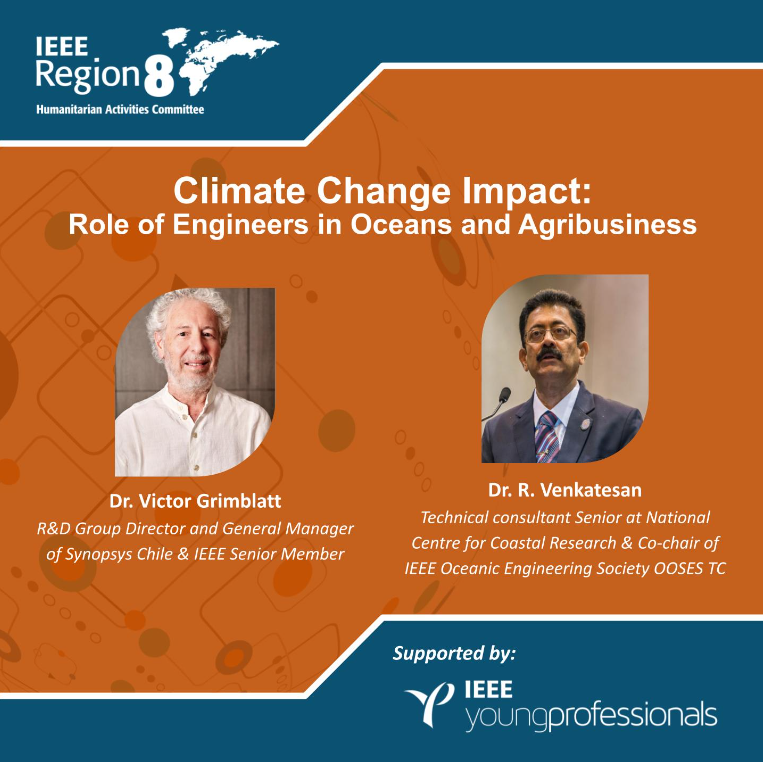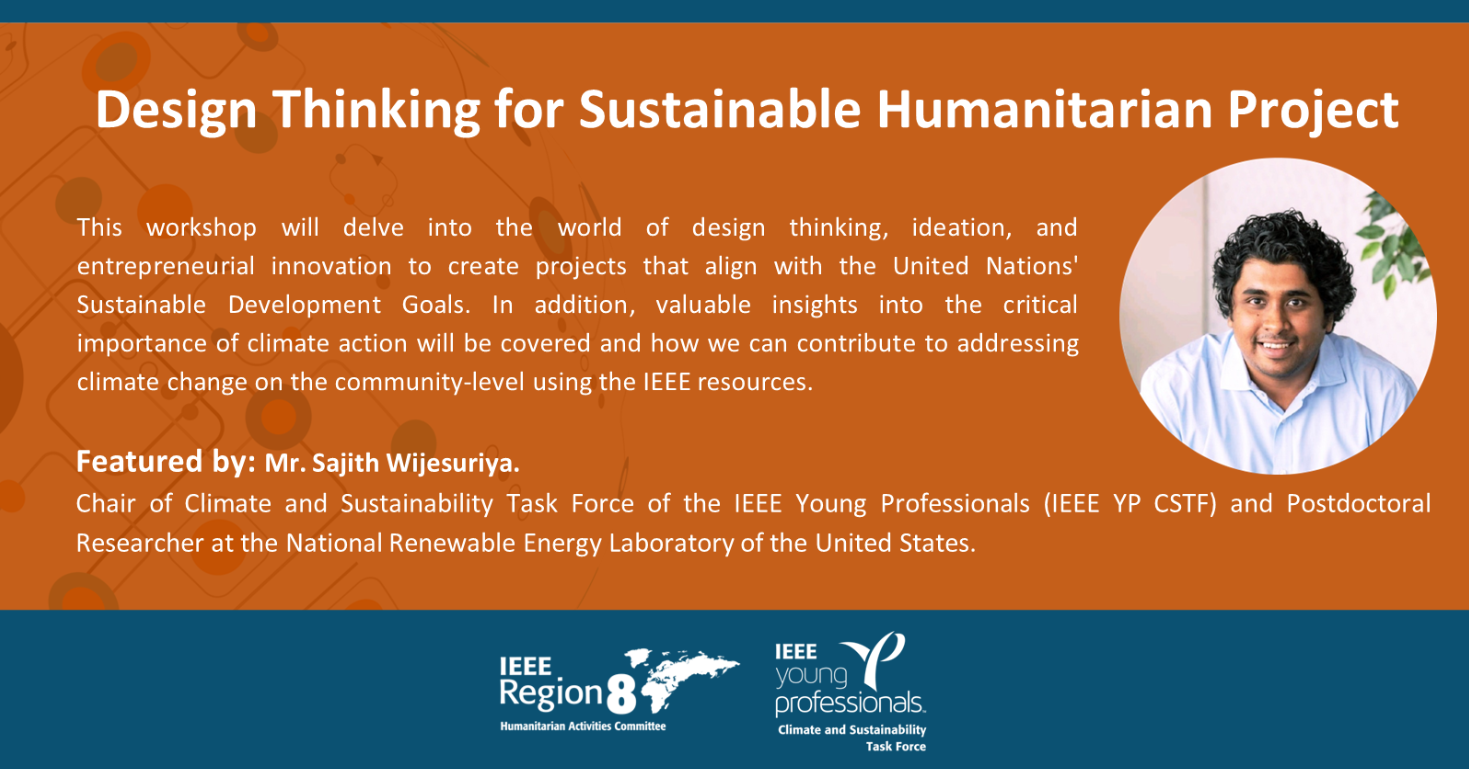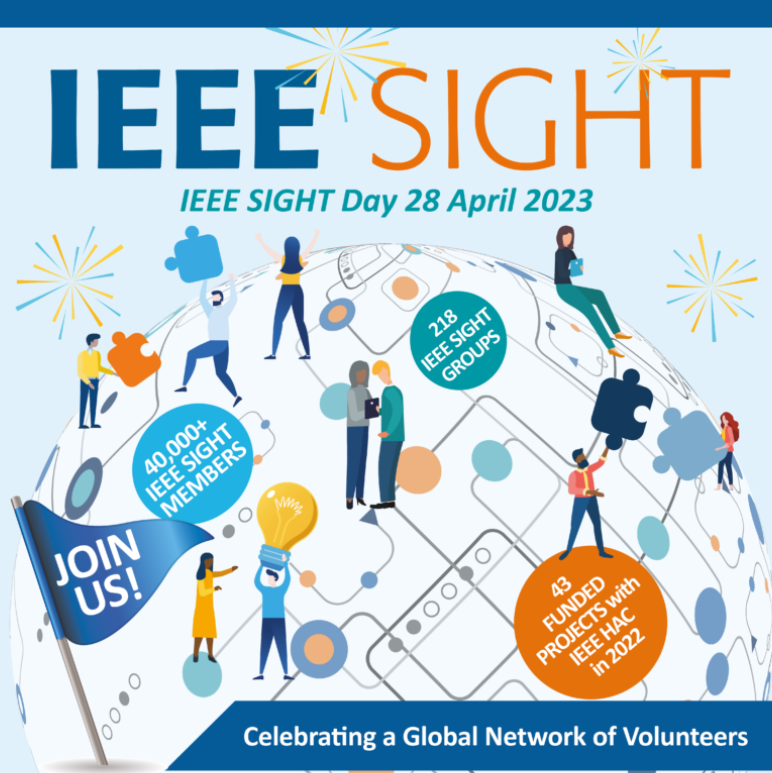Recent Humanitarian Activities across Region 8
Recognise Your Impact with IEEE SIGHT Awards: A Workshop Recap
Omar Salameh, IEEE Region 8 Humanitarian Technology Activities Committee
On Wednesday, December 11th, the IEEE Region 8 Humanitarian Technology Activities Committee (HTAC) hosted an inspiring workshop titled “Recognise Your Impact with IEEE SIGHT Awards.” The session aimed to empower IEEE members and SIGHT groups to amplify their influence through transformative community initiatives and achieve recognition for their efforts. The event was enriched by valuable insights from accomplished leaders, including Ahmed Aouididi, Chair of IEEE SIGHT Tunisia.
The workshop began with a warm introduction by Theodoros Chatzinikolaou, Chair of IEEE Region 8 HTAC. He provided an overview of the committee’s mission and highlighted various programs and initiatives designed to support SIGHT groups in delivering impactful humanitarian activities at the local level. This set the stage for an engaging and informative session. Omar Salameh, a committee member of the IEEE Region 8 HTAC, followed with an in-depth overview of the Region 8 SIGHT Awards. He explained the eligibility and evaluation criteria and detailed the nomination process, encouraging participants to aspire toward recognition by showcasing their impactful projects.
Learning from Success: IEEE SIGHT Tunisia
The spotlight then shifted to the main presenter, Ahmed Aouididi, Chair of the IEEE SIGHT Tunisia Section, which was recognised as the IEEE Region 8 Outstanding Section SIGHT of the year. Ahmed shared the inspiring journey of IEEE SIGHT Tunisia, demonstrating how their activities have profoundly benefited local communities.
Ahmed’s presentation was packed with actionable insights and key strategies for success:
- Teamwork Engagement: Build a diverse team with well-defined roles and responsibilities to foster collaboration and efficiency.
- Community Engagement: Actively involve team members with the local community to gather valuable feedback and ensure the initiatives meet genuine needs.
- Strategic Planning: Establish a clear mission and vision, and utilise tools to monitor progress and ensure alignment with organizational goals.
- Partner to Impact More: Collaborate with other organizations, community members, and stakeholders to share resources and knowledge, multiplying the impact of initiatives.
This workshop was a call to all IEEE members and SIGHT groups to recognize their potential to create meaningful change. By learning from outstanding examples like IEEE SIGHT Tunisia and understanding the IEEE SIGHT Awards process, participants left the session equipped to execute impactful projects and strive for excellence. The IEEE R8 HTAC continues to pave the way for humanitarian innovation and collaboration. Let’s work together to ignite change, one initiative at a time!
Climate Change and Green Energy Webinar: Advancing Sustainable Solutions
Neemat Abdelrahim, IEEE Region 8 Humanitarian Technology Activities Committee
On December 10th, the IEEE Region 8 Humanitarian Technology Activities Committee (HTAC) organized an impactful webinar titled “Climate Change and Green Energy,” as part of the Connecting Humanitarian Experts program. The keynote presentation was delivered by Simay Akar Koehler, 2024 IEEE Humanitarian Technology Board (HTB) Member, MOVE Global Committee Chair, and CEO & Founder of AKEC. Simay has been a pivotal figure in this initiative since its inception in 2023, driving forward the conversation on green energy and sustainability.
Simay Akar’s presentation was both insightful and thought-provoking. She discussed critical aspects of green energy, highlighting the significant impacts and challenges associated with sustainable energy. Moreover, she shared valuable insights into regional challenges and proposed practical solutions to enhance global energy sustainability. Simay emphasized the need for collaborative efforts, innovative thinking, and continuous investment in research and development to overcome these challenges and achieve a sustainable energy future.
With an impressive number of participants from more than 10 sections across the organization, the webinar demonstrated widespread interest and commitment to addressing green energy. The webinar concluded with a vibrant Q&A session, where participants engaged with the speakers, shared perspectives, and sought advice on various aspects of green energy implementation. In summary, the “Climate Change and Green Energy” webinar was a resounding success, fostering meaningful discussions and paving the way for future initiatives aimed at mitigating the effects of climate change through sustainable energy solutions.
Inspiring Young Minds: First-aid & Sustainability Day
Fatma Haouas and Baha Eddine Hammou, IEEE ENSIT SIGHT Group
IEEE SIGHT Group ENSIT, in collaboration with IEEE WIE SAG ENSIT and the Tunisian Red Crescent (TRC), organized a dynamic educational event on November 8th, simultaneously reaching over 152 students across three primary schools: Marseille Street School, Russia Street School, and Abdelrazak Chraibi School. The event focused on equipping children with life-saving first aid skills while raising awareness about the United Nations Sustainable Development Goals (SDGs) and engineering world. To ensure the event’s success, the team divided themselves into groups of board members and active members, delivering the sessions in parallel across all locations.The event was conducted by a dedicated team of 17 IEEE officers and members, along with 8 TRC members.
The day began with a comprehensive first aid training session conducted by TRC experts. Children were taught essential life-saving techniques, including how to respond when someone swallows their tongue and how to manage common emergencies. The hands-on training equipped them with vital skills that could prove crucial in real-life situations. Following the first aid session, the children were introduced to IEEE ENSIT SB, IEEE SIGHT, and IEEE WIE. This was followed by an engaging discussion on engineering and the SDGs, where we simplified these global goals for the children, making them easy to understand with real-life examples. To make the session interactive, we utilized resources from the official SDGs website, including the “Climate Action Superheroes,” turning complex sustainability topics into fun and relatable stories for the children.
The children also participated in an interactive “Recycling” game. Divided into groups, they were tasked with sorting various materials into the correct recycling bins, which reinforced the importance of waste management and environmental responsibility. The day concluded with the distribution of gifts, including books and stickers, ensuring that the children left with lasting memories of the event. This educational event underscores IEEE SIGHT Group ENSIT’s commitment to fostering learning and sustainability, with a focus on practical skills and global awareness, empowering the next generation to take action for a better future.

Installation of Solar Panels at Dreams Children’s Home and Ngamwa Dispensary to Provide Access to Clean Energy
Mahu Kimutai, IEEE Kenyatta University Student Branch
To be born and raised in an environment with little access to basic amenities such as electricity, water and health care can feel like a prison sentence. Yet this what lots of people in the world, particularly in Africa go through. The statistics, for example (about 600 million people lacking access to clean energy in Africa) may seem so large that it may dissuade us from putting in any effort towards combating the said challenges. Some people may have in mind, as a solution to these challenges; huge amounts of resources and complicated strategies, but this is not necessarily the case. Many a times, just a willingness and desire to shine hope (Angaza Tumaini translation in English) is enough to bring about a change. This is what IEE SIGHT Kenya has been involved in. Dreams Children Home is a school and home located in Ngong’, Kenya lacking access to clean energy and an ever increasing grid electricity bill month after month, year after year. This has led to more challenges faced by the pupils themselves such as inadequate time for study and insecurity challenges due to lack of security lights. Moreover, in Ngamwa Dispensary, located in the village of Ngamwa, Nyeri, Kenya also faces the same problem, that is, lack of clean sources of energy. Therefore, the dispensary has been unable to function effectively as it should leading to poor services.
In the midst of these challenges, it’s easy to despair and resign yourself to fate, yet some brilliant IEEE Kenya Section members sat down and sought a solution to the challenges bedeviling these communities. Thus was the birth of Angaza Tumaini Project and Ngamwa Solar Afya Project. In both cases, the idea was to install solar panels at the school and dispensary in order to provide clean energy, and reduce dependence on the grid electricity. Students, young professionals and community volunteers were onboarded to help with mentorship activities (aimed at the pupils), capacity building sessions, and project volunteering. I was priviledged to attend a mentorship session on January 20th 2024 at Dreams Childrens Home, and I was inspired by the effort put in by the organizing team such as Dr. Shadrack Mambo (IEEE CASS Kenya Chair), Felix Shadrach (Project Manager), Erick Mutuku (Tumaini Africa Lead), Allan K. Koech (Biomedical Engineer), Valery Chebet (IEEE Student Representative) and many more. As a volunteer, I got challenged to increase my knowledge on soalr energy and before long, I attended a training session about soalr energy at Dedan Kimathi University of Technology (DeKUT) on March 2nd 2024. This initiative was being led by IEEE DeKUT among them Mercy Runo, Sheila Otuko, Wandola Energy Systems among others.
The results of these rewarding efforts by IEEE Kenyatta University (in charge of Angaza Tumaini) and IEEE DeKUT (Ngamwa Solar Afya Project) were clear for all and sundry to see. In Dreams Children Home, over 300 pupils are now able to get access to clean energy and the school has reduced reliance on the costly grid electricity. The safety challenges experienced were solved after installation of security lights around the school and home. Moreover, in Ngamwa Dispensary, the community now boasts of receiving quality health services rather than travelling to other health centres, as was the case before, thereby incurring extra costs and spending extra time. The successes of these two projects show that to bring change, a complex grand plan or large scale funding does not have to be a prerequisite, we can start with what we have. Or as Sunny Bindra (a writer at Kenya’s Sunday Nation) puts it: “ The world doesn’t change through grand declarations or lofty plans alone. It changes because people roll up their sleeves and decide to act.”
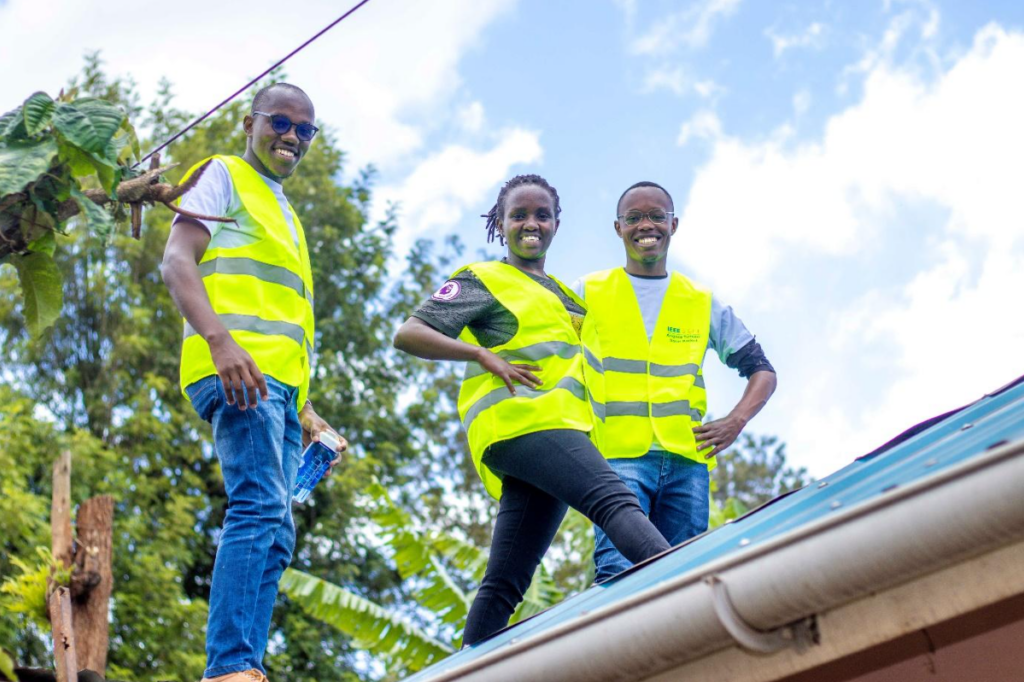
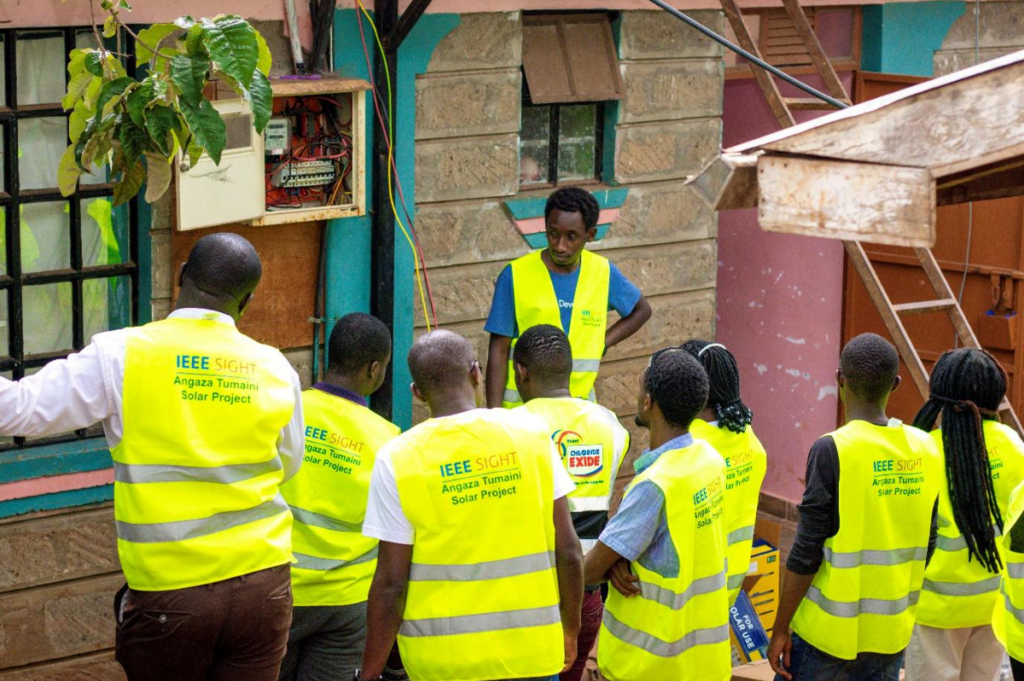
Images credit: IEEE Kenya Section SIGHT Group
Introduction to Humanitarian Technologies: A Collaborative Event by IEEE Democritus University of Thrace and University of Thessaly, Lamia Student Branches
Polyxeni Maria Begka, IEEE Democritus University of Thrace Student Branch
On November 9th, the IEEE Computer Society Chapter of Democritus University of Thrace cooperated with Lamia’s IEEE Student Branch to host a virtual event themed “Leveraging Technology for Humanitarian Solutions.” Held via Skype, the event brought together more than twenty attendees, including students and IEEE members, to explore how technological innovations can address global challenges. The presentations highlighted actionable solutions to two critical global challenges: environmental sustainability and energy security, in particular:
- Energy Scarcity: The transition to renewable energy sources was emphasized as an essential step toward ensuring sustainable and accessible energy for all.
- Waste Management: The problem of excessive waste accumulation was addressed with compression bins, offering a sustainable solution to optimize waste handling in urban areas.
The event was structured into two main parts. The first part introduced participants to IEEE’s global humanitarian actions, emphasizing the organization’s impact in areas like energy sustainability, waste management, and disaster response. This session provided attendees with a broader understanding of the role of engineers and technologists in driving positive societal change. In the second part, collaborative presentations took center stage. The team from Democritus University of Thrace presented a solution to waste management challenges through the use of compression bins, showcasing how this technology could optimize storage capacity and reduce environmental impact. Lamia’s team focused on renewable energy sources, presenting innovative approaches to tackling energy scarcity and advocating for cleaner energy alternatives to combat climate change.
This event fostered a sense of collaboration between IEEE Student Branches while inspiring participants to explore real-world applications of their engineering knowledge. Attendees left the event with practical insights and renewed motivation to engage in humanitarian projects within the IEEE community. The success of this collaboration underscores the power of teamwork and innovation in addressing humanitarian challenges. This event reaffirmed IEEE’s mission to apply technology for the benefit of humanity and inspired further initiatives to make a meaningful impact
